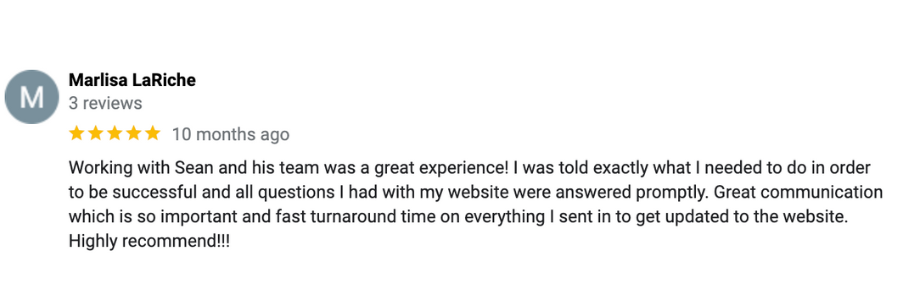Ideation Digital specializes in strategic marketing services that drive results for your business or organization, let us show you how our SEO Services can help grow your business on auto-pilot.
Is your online presence strong but your sales numbers remain disappointingly low?
Do you feel invisible online and know it’s affecting your sales growth?
Wondering if your business website actually brings in any customers?
Invested in online marketing but not seeing any increase in sales or customer inquiries?
The problem is there is more competition than ever for attention online and having a "good enough" online presence isn't good enough to get you customers anymore.
At Ideation Digital marketing we focus on building websites and SEO marketing programs that get you customers and leads, because why else would you invest in your small business marketing?
We understand the business saving impact of knowing you are getting consistent online leads from your website and online marketing. We are small business owners too.
That's why we only create online marketing that is optimized to produce sales and results. A.I. powered organic and comprehensive marketing systems that leverage the power of A.I. to create an online presence that actually makes the phone ring.

Want to discover how much not having an A.I. powered organic marketing system is costing your business already?
Get our digital marketing cheat sheet, made from a decade of experience in the industry, and customized for your business with exact steps to get consistent leads from your online marketing and finally feel like your online marketing investment is worth it!
How It Works
1. Analyze and Create a Strategy
We audit your existing marketing and needs, and help you figure out where your best opportunities are and agree on a plan that fits your goals.
2. Fast Implementation
Based on your strategy, we create your website and other marketing assets within a week so that you get leads FAST, and we offer unlimited editing so that your online presence always looks its best.
3. You Get Leads
Our expert team implements effective online marketing strategies to bring in leads and improve your local visibility, putting you in front of the right people at the right time so they actually reach out.
4. We Make Sure You Keep Getting Leads
We continue to monitor and actively manage your website, SEO, and digital marketing campaigns, allowing you to focus on your business while it shines online.
Here's what you get working with us:
Trust
We only recommend products and services that align opportunities with your goals. We focus on results for your business first.
Freedom
We manage all campaigns and assets for you. Need an update? No problem, send us an email, a text, or we will even create you a slack channel.
Growth
We don't just build websites, create SEO plans, and run ads for online marketing campaigns, we create comprehensive a.i. powered organic and paid marketing programs that bring you leads and customers.
See What Small Business Owners are Saying About Working with Ideation Digital








Professional Web Design and Development Services for Responsive Websites
Imagine a world where every click, swipe, and interaction on your website feels natural—tailored to fit the specific needs and expectations of each individual visitor. That's exactly what our professional web design and development services do; we create responsive websites that aren't just visually appealing—they function seamlessly across all devices. Dive in as we further unravel how our team of experts can transform your online platform into an engaging, user-friendly powerhouse!

At our digital marketing agency, we offer a range of comprehensive web design and development services to help businesses establish a strong online presence. Our services include custom website design, responsive web development, e-commerce solutions, content management systems, user experience optimization, search engine optimization, and ongoing website maintenance. Whether you need a brand new website or want to enhance your existing one, our expert team is here to help you achieve your goals.
Professional Web Design
In today's digital landscape, having a professionally designed website is paramount for any business or individual looking to establish an effective online presence. Professional web design encompasses various aspects such as layout, typography, color scheme, graphics, and overall aesthetics that seamlessly come together to create an engaging and visually appealing website.
Think of a professional web design as the carefully crafted facade of a physical store.
Just as customers are drawn in by an inviting storefront, users browsing the internet are captivated by a well-designed website. It creates a positive first impression and builds credibility for your brand, increasing the chances of user engagement.
A professional web design not only catches attention but also ensures that users can easily navigate your website and find what they're looking for. It emphasizes usability and functionality, creating a seamless user experience.
Now that we understand the importance of professional web design, let's explore another crucial aspect - customizing for better user experience.
01
It is projected that revenues of web design services in the US would reach approximately $40 billion by the end of 2023, indicating a growing demand for such services.
02
In 2020, it was reported that about 50% of all website traffic worldwide was generated through mobile phones. This underscores the importance of web developers who specialize in creating mobile-friendly or responsive websites.
03
According to Adobe, 38% of people will stop engaging with a website if the layout is unattractive or the content layout is not user-friendly, emphasizing why professional web design is crucial to online success.
In today's digital landscape, having a professionally designed website is crucial for establishing an effective online presence. Professional web design encompasses various elements that create an engaging and visually appealing website. Similar to an inviting storefront, a professional web design attracts users and builds credibility for your brand. It also prioritizes usability and functionality to create a seamless user experience. Customizing your website further enhances the user experience, making it even more user-friendly and interactive.
Customizing for Better User Experience
When it comes to web design, one size does not fit all. Each website has its unique requirements based on its target audience, industry, and specific goals. Therefore, customizing your web design plays a pivotal role in providing better user experiences.
By tailoring your website design to meet the needs and preferences of your target audience, you can create a personalized experience that resonates with users. This includes considering factors such as font styles and sizes, color schemes that align with your brand identity, and intuitive navigation menus that make it effortless for users to browse through your site.
Let's say you run an e-commerce website targeting young adults interested in fashion. A customized web design would employ modern and trendy aesthetics while ensuring seamless navigation between product categories. This tailored approach helps captivate your target audience from the moment they land on your website.


Customization also extends to responsive web design, which ensures that your site looks and performs well across all devices, be it desktop, mobile, or tablet. With the majority of internet users accessing websites from mobile devices, having a mobile-friendly design is non-negotiable in today's digital age.
Customizing your web design is like tailoring a suit. Just as a well-fitted suit enhances your appearance and comfort, a customized website improves user satisfaction and engagement.
By paying attention to customizing your web design, you create an optimized online experience that caters to your specific audience, effectively communicating your brand message and maximizing user engagement.
Building a Successful Online Presence with Design
In today's competitive digital landscape, having a visually appealing and user-friendly website is crucial for building a successful online presence.

Design plays a fundamental role in capturing the attention of visitors, conveying your brand identity, and ensuring an intuitive browsing experience.
A well-designed website not only grabs attention but also creates a favorable first impression. It showcases the professionalism and credibility of your business or brand, making visitors more likely to engage with your content or make a purchase. By incorporating visual elements such as color schemes, typography, imagery, and layout, web designers create a unique aesthetic that aligns with your brand personality.
For instance, let's consider an e-commerce website specializing in handmade jewelry. A professional web design team can create an engaging interface that highlights the beauty of the products through high-quality images and compelling visuals. They can ensure seamless navigation, intuitive product categorization, and an optimized checkout process to enhance user experience and maximize conversions.
Beyond aesthetics and user experience, web design also influences search engine optimization (SEO) efforts. Search engines like Google consider various design elements such as mobile responsiveness, site speed, and logical structure when ranking websites. A well-designed responsive website that loads quickly on different devices enhances your chances of ranking higher in search results, driving organic traffic to your site.
Web Development and Project Management
While design provides the visual appeal and functionality of a website, web development and project management are the behind-the-scenes aspects responsible for bringing those designs to life. Web development involves turning design concepts into functional websites using coding languages like HTML, CSS, JavaScript, and frameworks like React or Angular.

Effective project management is essential for successfully executing web development projects. It involves coordinating different teams or individuals involved in the project, setting timelines, managing resources, and ensuring smooth communication throughout the process.
Professional web development services provide technical expertise to build websites that are not only visually appealing but also scalable, secure, and optimized for performance. Development teams work closely with web designers to implement design elements while ensuring efficient functionality across different browsers and devices.
For example, when developing a complex web application that requires user authentication, real-time updates, and data storage, web developers use their expertise to create a robust backend infrastructure. They integrate databases, server-side scripting languages like PHP or Python, and frameworks like Laravel or Django to deliver a seamless user experience.
Effective project management ensures the timely completion of web development projects while keeping them within budget. Project managers coordinate timelines, allocate resources efficiently, and maintain effective communication channels between the design team, development team, and clients. Their role is crucial in overseeing the entire process and ensuring all parties involved are aligned with project objectives and deadlines.
In the world of professional web design and development services, utilizing the right technical platforms is crucial to create responsive websites that meet modern expectations. These platforms not only streamline the development process but also contribute to the overall functionality and performance of the website.
When it comes to front-end development, popular frameworks like React, Vue.js, and AngularJS provide developers with robust tools to build dynamic and interactive user interfaces. These frameworks enable efficient handling of data flow, component-based development, and seamless integration with back-end systems.
On the other hand, for back-end development, there are various programming languages and frameworks to choose from. JavaScript-based frameworks like Node.js have garnered immense popularity due to their scalability and performance benefits. Python-based frameworks like Django offer simplicity and rapid development capabilities. Ruby on Rails, PHP-based Laravel, and Express.js are also widely used due to their respective strengths in building specific types of applications.
Furthermore, integrated development environments (IDEs) play a crucial role in programming efficiency. Tools like MS Visual Studio Code, Sublime Text, Atom, and others provide developers with a user-friendly interface, code suggestions, debugging capabilities, version control integration, and plugins for enhanced productivity.
For instance, let's imagine a professional web developer named Sarah who is tasked with creating a responsive e-commerce website for a client. Sarah decides to use React as the front-end framework due to its flexibility in handling complex UI requirements and delivering a smooth user experience. For the back-end, Sarah chooses Node.js because it allows her to use JavaScript across the full stack of the project.
Technical Platforms Utilized

To ensure an efficient workflow, she relies on MS Visual Studio Code as her preferred IDE for its comprehensive features tailored specifically for web development.
By leveraging these technical platforms appropriately based on project requirements and industry trends, web designers and developers can deliver high-quality websites that not only meet user expectations but also drive business success.
Enhancing Business with Quality Assurance
The importance of quality assurance (QA) in web design and development cannot be overstated. Implementing effective QA processes ensures that websites function properly, have a consistent user experience across different devices and browsers, and are free from any significant issues or bugs.
Quality assurance involves rigorous testing throughout the development lifecycle. This includes functional testing to ensure that all features and functionalities work as intended, compatibility testing to verify the website's responsiveness across various devices and browsers, performance testing to assess loading speed and overall performance metrics, and security testing to identify potential vulnerabilities.
By investing time and resources into thorough QA, businesses can enhance their online presence in several ways. First and foremost, it helps build trust with users by delivering a seamless browsing experience. Users are more likely to engage with websites that function flawlessly across different platforms, which can lead to increased conversions and customer satisfaction.
Moreover, effective QA helps mitigate risks such as data breaches or application crashes that may have a severe impact on a business's reputation. By identifying potential issues beforehand and rectifying them, businesses can avoid costly post-launch fixes or damage control measures.
Let's consider an example of an e-commerce website. Without proper quality assurance, imagine if customers encounter errors during the checkout process resulting in incomplete transactions. This could lead to frustrated customers abandoning their purchases, resulting in lost sales opportunities for the business. On the other hand, with thorough QA in place, any potential issues would have been identified and resolved before the website went live, ensuring a smooth shopping experience for customers.
Ultimately, quality assurance serves as a vital step in delivering websites that align with business objectives, enhance user satisfaction, and drive overall growth.
In today's digital landscape, where users access websites on a multitude of devices, optimizing websites for responsiveness has become paramount. The goal is to ensure that websites not only look visually appealing but also function seamlessly across different screen sizes and resolutions.
One essential aspect of optimizing websites for responsiveness is using a mobile-first approach. This means designing and developing websites with mobile devices in mind from the start. By prioritizing mobile design, developers can create a clean and user-friendly interface that adapts well to smaller screens without sacrificing functionality.
Optimizing Websites for Responsiveness
For instance, imagine a potential customer browsing your website on their smartphone while commuting. If the site isn't responsive, they might struggle to read the content or navigate through the pages due to small text or buttons overlapping. This poor user experience could lead to frustration and ultimately drive them away from your business.
To achieve responsiveness, web designers incorporate fluid grid systems that automatically adjust elements based on screen size. This ensures content and layout adapt smoothly and proportionally across various devices. Cascading Style Sheets (CSS) media queries play a crucial role here, allowing designers to set specific rules based on breakpoints - defined screen widths where the layout should change.
Another critical consideration when optimizing websites for
responsiveness is image optimization. Large images can significantly slow down loading times, especially on mobile connections. Utilizing responsive image techniques like srcset and picture elements allows the browser to choose the most appropriate image file based on the device's capabilities, ensuring efficient loading without compromising quality.
Additionally, touch-friendly design elements should be incorporated into responsive websites. This includes using larger buttons and ensuring adequate spacing between interactive elements to account for touch gestures commonly used on smartphones and tablets.
Optimizing website performance is also crucial for responsiveness. Ensuring minimal code bloat, reducing unnecessary HTTP requests, and leveraging caching techniques can all contribute to faster load times – an essential factor in providing seamless user experiences across devices.
In conclusion, optimizing websites for responsiveness is essential in today's digital landscape. By adopting a mobile-first approach, incorporating fluid grid systems, optimizing images, including touch-friendly design elements, and enhancing website performance, businesses can create engaging and user-friendly websites that cater to users accessing them on various devices. Ultimately, this leads to improved user satisfaction, increased engagement, and conversion rates. So, ensure your website is responsive and optimized to provide the best possible experience for your visitors.




